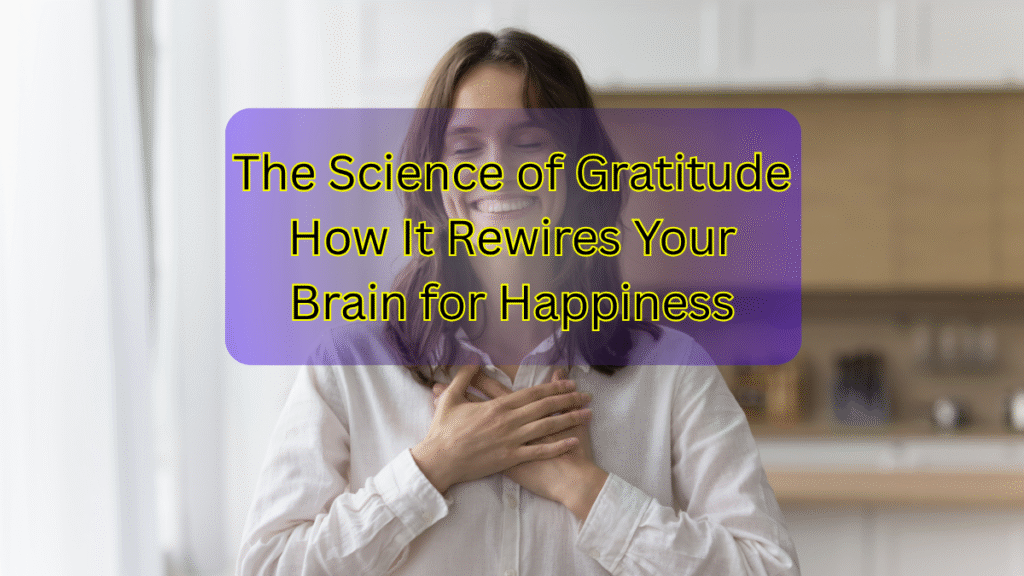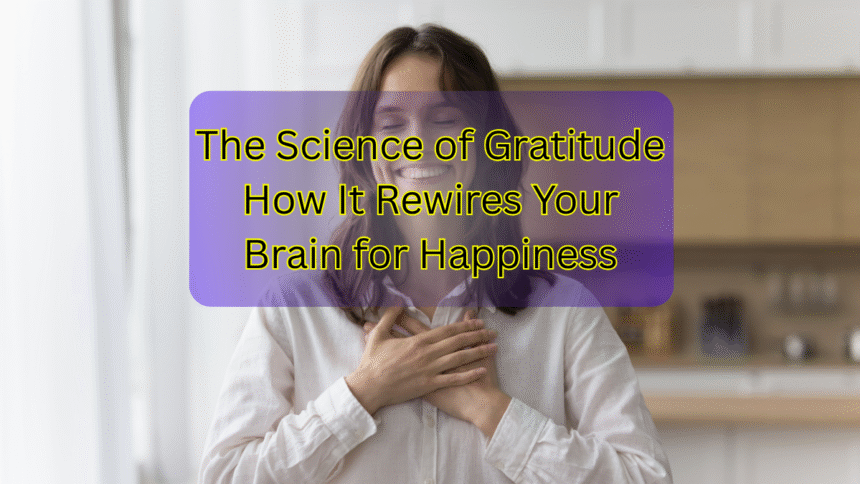Science of Gratitude
Have you ever noticed how taking a moment to appreciate the good things in life can instantly lift your mood? Gratitude isn’t just a feel-good emotion—it’s a powerful tool that can literally reshape your brain, making you happier and more resilient.
In this post, we’ll dive into the fascinating science behind gratitude, explore how it rewires your brain for happiness, and share practical tips to cultivate a daily gratitude practice. Whether you’re feeling stuck in negativity or simply want to boost your well-being, understanding the power of gratitude can be life-changing.

How Gratitude Affects the Brain
1. Gratitude Boosts Dopamine and Serotonin
When you express gratitude, your brain releases dopamine and serotonin—two key neurotransmitters responsible for happiness and pleasure. These “feel-good” chemicals reinforce positive behaviors, making you more likely to seek out and recognize good things in your life.
A study by the National Institutes of Health (NIH) found that people who practiced gratitude showed increased activity in the hypothalamus, the brain region that regulates stress, sleep, and metabolism. This means gratitude doesn’t just make you happier—it also improves your overall health.
2. It Strengthens Neural Pathways for Positivity
Our brains have a natural tendency to focus on negative experiences—a survival mechanism known as the “negativity bias.” However, gratitude helps counteract this by strengthening neural pathways associated with positive thinking.
According to Dr. Rick Hanson, a neuroscientist and author of Hardwiring Happiness, “What fires together, wires together.” The more you practice gratitude, the easier it becomes for your brain to default to positivity instead of stress or anxiety.
3. Gratitude Reduces Stress and Anxiety
Chronic stress can shrink the prefrontal cortex, the part of the brain responsible for decision-making and emotional regulation. But research from UC Berkeley suggests that gratitude activates the brain’s ventral tegmental area (VTA), which is linked to reward processing and stress relief.
By focusing on what you’re thankful for, you reduce cortisol (the stress hormone) and increase resilience against anxiety and depression.
Practical Tips to Cultivate Gratitude and Rewire Your Brain
Now that we know how gratitude changes the brain, how can we make it a daily habit? Here are some science-backed strategies:
1. Keep a Gratitude Journal
One of the most effective ways to train your brain for gratitude is by writing down three things you’re thankful for each day. Studies show that people who journal gratitude experience:
- Better sleep
- Lower stress levels
- Increased long-term happiness
Tip: Try the “Three Good Things” exercise—before bed, list three positive moments from your day.
2. Practice Mindfulness and Meditation
Mindfulness meditation helps you stay present and appreciate small joys. Apps like Headspace or Calm offer guided gratitude meditations that can rewire your brain over time.
3. Express Gratitude to Others
Sending a thank-you note or verbally appreciating someone strengthens social bonds and enhances your own happiness. A Harvard study found that expressing gratitude improves relationships and personal well-being.
4. Reframe Challenges with Gratitude
Even in tough times, asking, “What can I learn from this?” shifts your mindset from victimhood to growth. This builds emotional resilience and keeps negativity at bay.
Video Credits
5. Use Visual Reminders
Place sticky notes with gratitude prompts (e.g., “What made me smile today?”) around your home or workspace. These cues keep gratitude top of mind.
Common Questions About Gratitude
1. Does Gratitude Really Change the Brain?
Yes! Neuroplasticity—the brain’s ability to reorganize itself—means consistent gratitude practice can physically alter brain structure, enhancing happiness over time.
2. What If I Don’t Feel Grateful?
Start small. Even acknowledging basic comforts (a warm bed, a meal) can kickstart the habit. Fake it till you make it—your brain will catch up.
3. How Long Until I See Results?
Research suggests noticeable changes in as little as two weeks, but long-term benefits deepen with regular practice.
Final Thoughts: Make Gratitude a Habit
Gratitude isn’t just a fleeting emotion—it’s a mindset that rewires your brain for lasting happiness. By incorporating simple practices like journaling, mindfulness, and expressing thanks, you can train your brain to focus on the good, reduce stress, and improve overall well-being.
Ready to start? Pick one gratitude exercise today and commit to it for a week. Notice the shifts in your mood and mindset. And if you found this helpful, share it with someone who could use a happiness boost!











